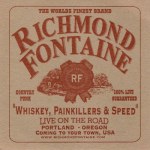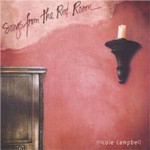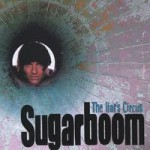 Stephen Malkmus (and the Jicks)
Stephen Malkmus (and the Jicks)
Stephen Malkmus
Matador Records
After a decade and five albums with the Stockton, California based band Pavement, leader Stephen Malkmus decided to make a decidedly sidewards career move by relocating to Portland, Oregon without his bandmates. With Pavement’s demise, Malkmus commenced to record a solo album in his newfound hometown. Enlisting the services of drummer John Moen, late of the Maroons, and before that, the Dharma Bums, and bassist Joanna Bolme of the Minders, Malkmus has crafted an album which easily fits into the Pavement oeuvre, albeit with a somewhat lighter, Pop touch.
Intact, however, remains Malkmus’ intense, DIY approach. At every turn he dresses down his straight-ahead rock musical sensibilities and the arcane poetic detritus which comprise his lyrics. Malkmus echoes Neil Young in the former and Ray Davies in the latter, as part of the next generation of individualistic musicians, who express themselves in uniquely distinctive ways. What is most apparent from this album, is just what part of Pavement was Stephen Malkmus— and what part of Stephen Malkmus was not Pavement.
The lead track, “Black Book,” rides upon a fragile, early Neil Young-type of raver riff, with a slithery keybass sliding along underneath. The memorable chorus is rooted in an absurd hookline: “ The black book you took was permanentally diversified.” Oh. Okay. Sure. I get it now. Something about a black book.
Jimmy Buffett in a black hole is “Phantasies.” Jaunty, marimba-toned keys and jangly acoustic guitars are propelled by a propulsive beat. Buffett’s tropical paradise has been lyrically transported by Malkmus to somewhere in Alaska, where Sarasota, Florida is but an igloo daydream.
The intro and the first verse of “Jo Jo’s Jacket” deal with the life and career of screen star Yul Brynner. Over a flaky piano and a revival-like clapping sound, Brynner himself is brought back from the dead, to transcribe his reasoning behind the decision to shave his head. “A liberation from a lot of stupid vanities, really.” Malkmus’ verse, which follows, characterizes Brynner somewhat differently. “I’m not what you think I am/I ‘m the ki-ing of Siam/I’ve got a bald head/My name is Yul Bryn-Ner/And I am a famous movie star/Perhaps you saw me in Westworld/ I acted like a robotic cowboy/It was my best role.”
It is uncertain that Yul Brynner, the real person, felt that his role in Westworld was the pinnacle of his career. One supposes that Malkmus would find the fun in a song (erroneously) quoting himself as to the highpoints of his own career. The succeeding verse seems to have nothing at all to do with Yul Brynner, leading one to wonder if Malkmus doesn’t suffer from Attention Deficit Disorder, otherwise known as Paul McCartney’s Affliction.
“Church On White” serves as a vehicle by which Malkmus demonstrates that he has the chops to be a fine guitarist , when he is of such a mind. “The Hook” is an odd fantasy wherein “On page nineteen I was kidnapped by turkish pirates/Mediterranean thugs/ After some torture they considered me their mascot.” A Lou Reed meets early Stones mood seems to prance around this weird pirate tune.
A Frank Black feel pushes “Discretion Grove.” An array of admittedly cheesy keyboard effects punctuate “Troubbble,” witty, perhaps for its brevity , at a minute and a half in length. “Pink India” is another song based upon a pretty, sort of Delta Blues guitar figure. Subtle slide guitar ruminations decorate the lovely “Trojan Curfew,” possibly one of the most concise and succinct songs Malkmus has ever written.
The hypnotically laid-back “Vague Space” features as part of its chorus, a cryptic reference to the Beatles’ “A Day In The Life,” “I’d love to turn… you off.” Similarly, “Jenny & The Ess-Dog” exhibits certain ‘60s Baroque properties in the melody of the verses. The final track, “Deado,” seems to carry on a lyrical theme begun in the preceding song. At least, the song appears to address someone named Jen.
It’s easy to like Stephen Malkmus’ music. It is unpretentious, unassuming stuff. Still, one wonders just how great his music might be if he did have a few pretensions, if his attention span could last long enough to accomplish the task of writing a complete song: music and words. Certainly he demonstrates the ability (with “Trojan Curfew, especially) to craft great Pop songs, but not the ambition. This is not a great album, but it’s not clear that Malkmus has a great album in him, or even wants to be responsible for such a thing. But this album is exactly what Malkmus wants for it to be.
 Richmond Fontaine
Richmond Fontaine
Whiskey, Painkillers and Speed
Cryptophonics Records
The fourteen songs (and six tracks of filler) presented here were recorded live, in various locations across the nation. Ostensibly a musical tour, pedal steel guitarist Paul Brainard described the mission more precisely: “In Portland we got a place called the Space Room that’s… you can’t find any place that pours a better shot than the Space Room. So we’re on a kind of nationwide search for the equal to the Space Room.” To which bandleader Willy Vlautin adds “It’s a study we’re doin’.”
And that’s what you get here, exactly as advertised. “Whisky, painkillers and speed.” It is not some quaintly turned phrase to euphemistically describe life on the road for the band. It is the reality of Richmond Fontaine. As might be expected the songs are basically poorly recorded (in many cases, in mono), sloppy and uneven. But the power of Vlautin’s compositions still comes through. The majesty of Brainard’s lush pedal steel is still clearly evident.
A few of the songs performed here were culled from RF’s previous albums, Safety, Miles From and Lost Son. Four more are cover tunes ranging from Buck Owens’ “Made In Japan” to Judas Priest’s “Breakin’ The Law,” including songs by green On Red, as well as Soul Asylum.
Still, this recording is not likely to win the band a lot of new fans necessarily. Vlautin’s songs are about people who live on the edge, held in delicate balance between existence and destruction. While it is a measure of audio verité to record the material under these conditions: essentilally empty rooms across the country; indeed, it sounds at times as if the characters within them are performing the songs— it is also a decidedly lo-fi transmission.
Just the same, this album is a true-to-life chronicle of the travels and travails of this fearless foursome, warts and all. While the results might not be pretty, they are certainly real enough, which for many people might be reward enough for their listening efforts.
 Nicole Campbell
Nicole Campbell
Songs From The Red Room
Wrought Iron Records
It’s been over two years since Nicole Campbell released her first solo album, Little Voice to widespread critical acclaim. But even that was not her first exposure within the local scene. In addition to two years in the mid-’90s with the band Ivan’s Wish, Nicole’s services have been in high demand as a back-up vocalist. Here, as with her previous solo album, Nicole has secured the aid of many of Portland’s finest musicians— the foremost of whom is producer extraordinaire Tony Lash, a multi-instrumentalist in his own right.
To be sure, the addition of Lash to her crew ensures that the songs (with one exception) sound much different than those presented on her previous album. Lash’s knack for creating unusual sonic environments is given free rein here. In much the same way that folkie Shawn Colvin seems to have embraced new sounds with her recent album release, Campbell accomplishes a similar feat with her album.
Lash’s influence is so strong however, that the opening track “Road To You” (featuring Luther Russell as one man backup band) seems like a non-sequitur in reference to the other eight tracks produced by Lash— the mood they create is that intense. Nicole’s songs are never whimsical, lighthearted romps, but always fierce, heavily wrought affairs; intelligently written and well sung, but darkly impassioned. Like Alanis Morissette singing the Sarah McLachlan songbook, with Colvin looking on.
And, though there are no “hit” songs here upon which to hang a memorable hook, the level of Campbell’s songwriting is still consistently high. Smart, emotionally deep, impeccably rendered. Nicole’s voice is rich and evocative, her delivery controlled, yet passionate.
“Road To You” flirts with a sturdy rhythm backing, as Russell propels the song with guitar and Wurlitzer piano bluster. A fairly strong chorus, filled out with a flutey organ figure make of this a definite choice for single, though an annoying guitar solo in the middle mars the effort.
Lash’s influence comes immediately into full play on the second track, “Fly Away.” A metronomic drum loop purrs and putters as Nicole joins on acoustic guitar. Soon a volume-pedaled electric guitar enters the sonic picture, as snappy real-time drums supersede the loop. As the vocals reach the crescendo of the pretty chorus (bearing some resemblance to the spiritual of the same name). Again, an unusual choice of instrumentation for the solo, a backwards guitar made to sound like a pedal steel guitar (or perhaps a backwards pedal steel guitar) removes the song from out of the mainstream, into another category. Odd.
An unusual volume-pedaled electric guitar adorns the pretty waltz “Undertow,” as well. But it is Lori Presthus’ swooning cello lines that solidify the arrangement. A lovely little song. A powerful arrangement drives “Shelter Of You,” though it’s not one of the stronger songs of the set. “Breathe” too receives a subtly lush arrangement, though the song is somewhat derivative at its core, sounding a bit like Tori Amos’ “Silent All These Years.”
“Sandpaper Shoes” could pass for the work of McLachlan, the same yodeling warble appearing in the emotional clutches. Again, the choice of a backwards guitar solo seems contrary to what the song is saying lyrically, but it is well-executed all the same. “Pretty Little Hands” moves toward a more conventional arrangement and is better for the choice.
“Victory Of The Body” seems not to have much accompaniment at all, other than a single guitar. “Visions Of Red” is strangely reminiscent of Judy Collins rendition of Sandy Denny’s “Who Knows Where The Time Goes,” a slow, pastoral meditation.
Tony Lash and Nicole Campbell combine to create an original sound. Lash’s guitar musings bear much in common with some of Daniel Lanois’ work. For her part, Nicole Campbell sometimes seems nearly swallowed up by the arrangements, quite a feat considering her stature as a vocalist.
But, for whatever the reason the combination seems not to work as well as it might look on paper. Lash’s brilliant, but off-kilter guitar phrasings just don’t seem to mesh with Nicole’s forthright delivery. The sound is lush, clean and precise. Nicole is obviously very talented. Lash is obviously very talented. The result of their work together is sonically appealing, but not as cohesive as might have been hoped.
 Sugarboom
Sugarboom
The Liar’s Circus
Strawberry Fields Records
Head Sugarboomer Michael Donhowe guides the band into it’s third decade and second millennium with this spirited twelve song set, perhaps the band’s best work ever. Though the group hasn’t released an album for many years, their sound here is still fresh, if a little rough around the edges. With the addition of drummer Jeff Cavanaugh (formerly of Completely Grocery) the trio, which includes singer/guitarist Matthew Peterson, is instrumentally quite solid. Vocally, things get a little dicey at times; but that shortcoming does not detract from the inherent charm that is clearly evident within their material.
The first track “Hold On’ takes a while to develop. A simple vocal melody, reminiscent of the song “Ring Of Fire,” supported by a big beat, acoustic 12-string flourishes and electric guitar lead lines, accompanies a simple lyric. “Calm down and look around/ You hear the sound/deep underground/Find your way to where we are/Don’t need a car/Your favorite bar/You don’t need a new guitar/You know you are/A rock star/Movie stars are everywhere/Look over there/Their greasy hair.”
It is a full two minutes and forty-five seconds before the band turns a corner into the chorus— a Beach Boys-like exploration of close (pretty close, in this case) vocal harmony. The resolution is nicely played out, an Eastern tinged drone. “Planet” sounds a lot like mid-’80s Psychedelic Furs. A piece of filler.
“Electroglide” almost works perfectly. The misguided harmonies of the chorus have an early (VERY early) Who-like ingenuousness, coupled with a Beach Boys mindset. Very interesting. The idea of the song is willing, but the vocal execution is a little weak.
More successful is “Firecracker,” another song informed by ‘80s Brit New Wave, but with the orchestral touches of guest Kaitlyn Ni Donovan’s chiming mandolin and soaring violin passages; especially her extended violin solo at the end of the song. Very nicely done. “Mission” is a simple song, simply done.
The title track, is a Beatlesque suite that comes off quite well, building tension slowly throughout the course of the ten-minute opus. Pretty impressive. Equally impressive is “Lost Control,” a beautifully understated ballad, rooted in a simple Satie-like piano figure. “Motorway” seems to melodically paraphrase the Beatles’ “I’ve Just Seen A Face,” in the verses, while skittering upon an ‘80s, Cure-like beat. The chorus manages to incorporate Petula Clark’s “Downtown” into the musical fabric without sounding totally fruity. That’s something of an achievement in and of itself.
The buoyant sunniness of “Charismatic,” could be the work of early Squeeze. Short but sweet. The ballad “Anyway” keeps it simple, sounding like something Roger Watters might put together. The finale, “Bar Song” is a jolly, harmonica-laced sing-along that does no harm.
If one were to judge this album from an audition of just the first three songs, one might think the outlook was pretty hopeless for Sugarboom. But over the course of the entire eleven songs, one can hear that there is a lot at work in the band’s music. While the various elements sometimes go awry in these musical experiments, other times they combine very nicely.
While it may be true that on occasion the band’s reach extends beyond its grasp, it’s incredible how close Sugarboom’s music often is to the hipness of the Dandy Warhol’s. If Stephen Malkmus heard Sugarboom, they would be his favorite band and he would produce their next album in about 2007. Yul Brynner told me so.
 The Red Sector
The Red Sector
Zone
Opal Studio
Citing in their liner notes affiliates of the Dan Reed Network, including Mr. Reed himself, the Red Sector demonstrate stylistic similarities to DRN: a tight rhythm section, big, tough guitars, with flashes of keyboard pyrotechnics, subdued vocals, with hooks aplenty. This young trio displays precocious abilities, with a strong sense of dynamics and knack for ballsy rock songs. As slick as blue ice.
All seven songs presented here stick to a fairly strict formula. One of the best of the bunch is “Need To Fall.” With an intro that sounds lifted off of the Cars’ Candy-o, the song quickly retreats in the verses to a few well-placed guitar adornments over a drippy liquid drum loop. Crunchtime in the second verse, with Kevin Hahn’s big guitars and Adrian Ost’s hard-hitting drums, As if Prince and Cheap Trick came together in some grand musical convocation. Vocalist Jimi Evans has a Robin Zander rasp to his voice, with maybe a touch of Billy Corgan mixed in.
The band would seem to have the look and the chops to succeed in the music business. Their music is somewhat anachronistic, but it’s just about time for an ‘80s revival. The Red Sector are well-positioned if that wave should happen to develop.
 4th Plane Jaiant
4th Plane Jaiant
BiPolar
Self Produced
Nearly two years in the making, this epic, 4th Plane Jaiant’s second album, was certainly worth the wait. At times leader Chris Galyon sounds like Dave Matthews fronting Rush. Other times the band sounds simply alot like the Dave Matthews Band. But at all times this stirring quintet displays impeccable taste and the skill to pull off whatever musical gymnastics they choose to perform.
As a guitarist, Galyon is the Alex Lifeson of the band. As a vocalist, he is Peter Gabriel, he is Sting. He is Colin Hay of Men At Work. Offsetting Galyon’s prodigious fretwork, Jason Wilbur adds jazz-inflected strains on sax and Jimmy Sanders injects soulful organ and keyboard layers. The rhythm section, bassist Andy Kallenberger and drummer Troy Schenk, lay heavy reinforcement to the foundation.
The lead track, “Let It Breathe,” rides a stampeding staccato guitar lick through the steep terrain of the verses. The chorus creates a new metal sound: big guitars and saxophone knocking it out together, “Everything In Between” dances wildly in the verses, before slashing through the choruses.
“As Far As I Can Go” is blue-eyed Reggae along the lines of Sting or Colin Hay. A strong, memorable chorus makes of this track world class stuff. “Kerosene Angel” typifies the Rush connection. A gorgeously vibrant chorus jack-hammers it’s way into the brain. Stunning stuff. The gentle strains of “Sure To Come,” accented by Sanders’ chunky piano fills, is another stand out track.
They all are truly stellar cuts, each of the ten included in this package. 4th Plane Jaiant exhibit complete command of their idiom— tighter, and with better chops, than the Dave Matthews band. In addition, Galyon is far less annoying as a vocalist than Matthews, free of distracting tics and mannerisms. The Jaiants rock a lot harder than the DMB, as well.
This is intelligent music, executed with pinpoint precision by superb musicians. Lyrically, Galyon is introspective and poetic, without being obtuse. He does not posture or pose. Instead he confronts his demons artistically, with carefully constructed didactic polemics, hewn from experience and chiseled from knowledge hard won. It’s powerful stuff. Very powerful.
